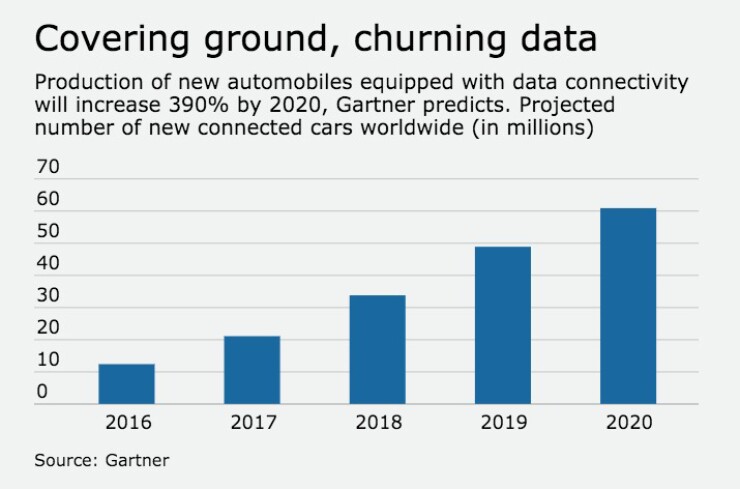The Consumer Electronics Show in Las Vegas — where all kinds of technology is unveiled every January — does not get a lot of attention from bankers. But maybe it should, given some of the announcements from automakers at the event this year.
Imagine a future where cars are like personal assistants for daily living — giving advice on how to become a better driver, how to stay more relaxed behind the wheel, what songs to listen to, and which route to drive, depending on your mood, schedule, stress level, or all of the above.
This is already starting to happen, thanks to connectivity that links vehicles to servers in the cloud. And cars with such advanced capabilities portend new revenue streams, not just for automakers,

Consider what automakers like Ford, Toyota and smart had to say about the initiatives they have underway.
Ford announced that its vehicles will soon allow drivers to use Amazon's Alexa — similar to Apple's Siri — to listen to audiobooks on the road, request news, play music, add items to Amazon shopping lists and more.
How the use of Alexa in vehicles could evolve is open to the imagination. A future iteration could encompass mobile payments of one type or another — perhaps at gas pumps, drive-thru windows, or parking garages.
General Motors uses diagnostic algorithms and cloud computing to predict and preempt parts failures for a few basic components under the hood, including the battery and fuel pump. If something seems wonky, the system will email or text the owner of the vehicle to get the part replaced before it fails.
Another take on this technology comes from Toyota, which announced a new telematics system at CES. Its system will connect Toyota vehicles to a preferred dealer so that when maintenance or repairs need to be scheduled, customers can contact the dealer through the screen on the center console and send vehicle diagnostic data.
It is conceivable that these services could evolve to include the payment. After the mechanic finishes the job, the payment could happen automatically through cloud services connected to the car. No need for pulling out a wallet or swiping a credit card.
Smart, a division of Daimler, announced at CES that it will soon start testing a new program that allows the owners of its cars to participate in private car sharing — which also has implications for banks.
The initiative, called "smart ready to share," is aimed not only at young people, but also small-business owners, who can use it to manage vehicle fleets.
"What we are launching here is nothing less than the Airbnb of the car sector," said Annette Winkler, CEO of smart, in a press release announcing the program.
The system smart developed uses a smartphone app and requires a small "connectivity box" be added inside each car at the base of the windshield (available as an option on new models and as a retrofit to existing ones).

The owner of the vehicle sets times during which it is available to others to drive and invites people to use it — just friends and colleagues for the initial beta test, but ostensibly anyone once the program launches in earnest.
People who fit criteria set by the owner can then book time using the app and open the door with their smartphone. A key must be left inside to allow for driving. The vehicle is later returned to a predefined area set by the owner.
Though smart is absorbing the cost of the beta test, including that of additional insurance required for users, the idea is that customers will eventually be able to use the car-sharing program to defray all the costs of ownership, with the app helping determine what rates to charge.
Another interesting idea smart recently started testing, called "ready to drop," uses the same connectivity box at the base of the windshield to allow DHL delivery reps to unlock a vehicle and drop off a package in the trunk for the owner to retrieve later — a handy solution to the problem of not being around to accept it in person.
Services like this also could involve facilitating a payment at some future point.
"We are working intensively on the question of how cars can help make people's lives easier. If the car receives parcels, customers have more time to do things they really enjoy," said Dieter Zetsche, chairman of the board of management at Daimler.
Check out our story on





